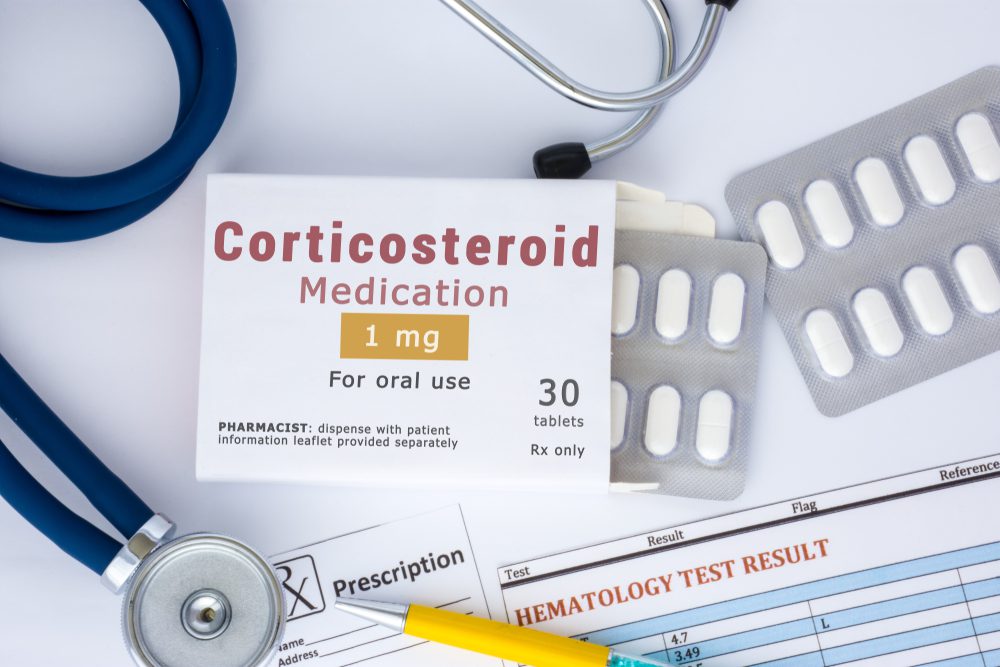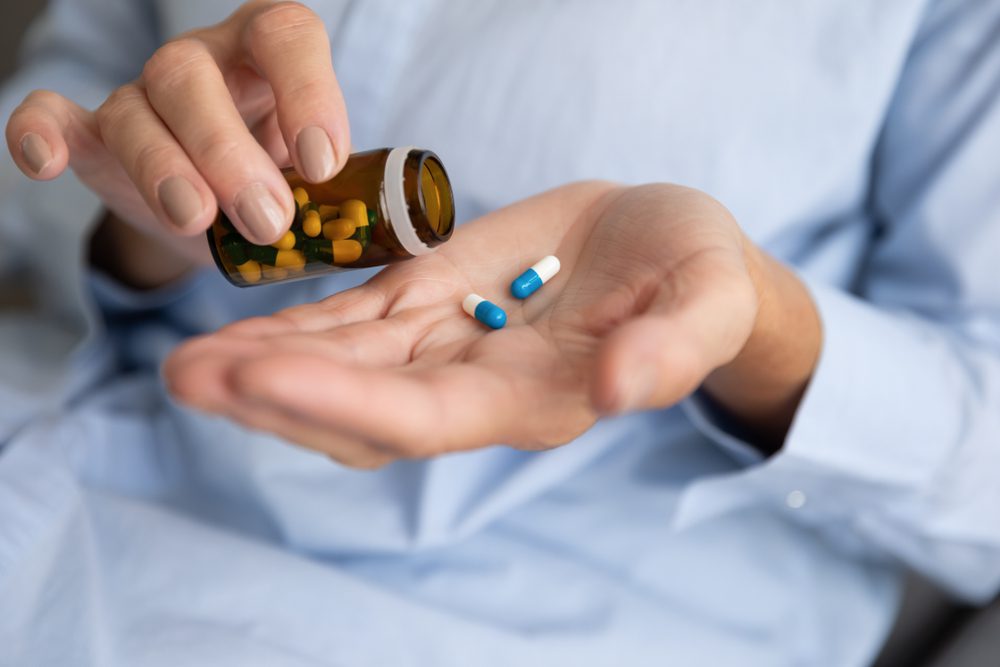Do you know any medications that make you gain weight?
I’m pretty sure that if you’ve watched any drug commercials, you know that many medications have a lengthy list of side effects. While many of them can give you headaches, nausea, or stomach pain, one of the most common symptoms for a few of them is weight gain.
Even though taking medications that make you gain weight is better than being sick, seeing a larger number on the scale can be upsetting, especially if you have certain health and fitness goals.
Of course, you can always ask the doctor or the pharmacist for a few tips on how to stay in shape, even if you take that medication, and eating nutritious and healthy foods and moving your body is going to help.
These techniques will help balance the effects of those medications that make you gain weight, and they will also help you feel good. Here’s how medications that treat anxiety, depression, arthritis, or allergies may impact your weight.
Whether you’re taking a steroid to manage your pain or an antihistamine to stop your sniffles and sneezes, you might be recommended medications that make you gain weight. Let’s talk about them and how they can impact the number on the scale!

1. Corticosteroids
Oral corticosteroids, like prednisone (deltasone), are used to treat a variety of illnesses, including lupus, back pain, arthritis, and asthma. While these medications do their job fantastically, they’re part of the medications that make you gain weight due to the side effects you might be experiencing, such as altered metabolism, fluid retention, and increased hunger.
Doctors say that corticosteroids should be taken with food, and the best way to combat those annoying side effects is by pairing them with a nutritious, well-balanced snack like almonds or yogurt.
Moreover, to reduce adverse effects, oral steroids are typically used for brief periods (such as one or two weeks). Unfortunately, long-term use of them might make it more difficult to manage weight gain, so you should pay more attention to your diet and exercise routine.
2. Tricyclic antidepressants
Amitriptyline (Elavil), doxepin (Silenor), and nortriptyline (Pamelor) are some of the medications that make you gain weight because they boost hunger.
According to Harvard Health Publishing, if you’re taking antidepressants, talk to your doctor about it before stopping abruptly, and create a plan that will best support your mental health.
If you feel like quitting your prescription because of weight gain, it’s best to talk to your doctor about moving to a different class of antidepressants so you still feel good.
Doctors say that fluoxetine (Prozac) is thought to be weight-neutral, while bupropion (Wellbutrin) or duloxetine (Cymbalta) are known to have weight loss as a side effect. Talk to your doctor about the right medications for you because your health should be a priority.

3. Antihistamines
Did you know that antihistamines are among the medications that make you gain weight?
You’ve probably taken antihistamines if you have allergies or if you have ever experienced an annoying itchy rash. Research has indicated that people who use specific antihistamines regularly weigh more and have a larger waist circumference than those who do not.
According to research, this connection was discovered with the H1 receptor antihistamines desloratadine (Clarinex), fexofenadine (Allegra), and cetirizine (Zyrtec). But why? The short answer is this: the body’s histamine suppresses hunger signals.
On the other hand, health experts say that antihistamines might have their way of interfering with fullness signals. One substitute for these medications that make you gain weight is nasal steroid sprays, such as fluticasone propionate (Flonase). These function differently than oral steroids, and in many cases, they don’t cause patients to put on some extra pounds.
4. Insulin
You probably know that insulin is important for diabetes treatments but is also one of the most popular medications that make you gain weight. This happens because the hormone facilitates your body’s absorption of bloodstream glucose. Since it helps your body’s cells function properly, glucose is a positive thing. So why does it impact your number on the scale?
If your body doesn’t use the sugar for energy after it is taken up from the bloodstream and deposited into the cells, it will be turned into fat. And that’s why your body is puffier than it was before.
Moreover, you will gain weight if you overeat, especially if you follow your cravings, such as high-sugar items like candies and pastries. You can eat everything you want, but in moderation, and don’t forget to have an active lifestyle.
Your doctor probably told you to take insulin if you have type 1 diabetes. But if you have type 2 diabetes, the good news is that lifestyle changes can help improve your insulin function. This means that eating healthy and nutritious foods and moving your body can lower and eventually eliminate your insulin dosage.
The are a few other medications that make you gain weight! Keep reading for more!
5. Epilepsy medications
If you were or are an epilepsy patient, you already know that some medications make you gain weight. Doctors say that seizure-treating medications such as gabapentin (Gralise), pregabalin (Lyrica), and vigabatrin (Sabril) might enhance hunger and cause you to gain unnecessary pounds.
It’s important for patients taking these drugs to understand that gaining weight could have an adverse effect and that their health should always be a priority, rather than the number on the scale.
If this side effect bothers you, talk to your doctor about switching to weight-neutral or weight-loss-associated epileptic drugs, and they might recommend you lamotrigine (Lamictal), felbamate (Felbatol), or topiramate (Topamax).

6. Beta-Blockers
One of the most popular medications that make you gain weight is beta-blockers, used for treating hypertension. If you take metoprolol (Lopressor) and atenolol (Tenormin), you’re more likely to see the number on the scale going up, but doctors have no apparent explanation for this side effect.
According to research, these medications can make you feel fatigued, especially at the beginning of the treatment when your body isn’t used to them. If you take any of these medications, make sure you still incorporate movement into your life, because beta-blockers can lower your exercise tolerance and slow down your heart rate.
If you can’t hit the gym or don’t have the energy to do a hard workout, hitting 10,000 steps a day is going to be a major help, especially since these medications can also slow your metabolism. Don’t forget to talk to your doctor if you feel like this treatment is affecting your physical health.
7. Sulfonylureas
We’re almost done talking about medications that make you gain weight, but we can’t end today’s discussion without saying a few words about sulfonylureas. These medications are used for treating diabetes, and they’re amazing for lowering your blood sugar levels by 20%.
While they’re amazing for your health, they’ll make you gain around 4 to 5 pounds. Gliclazide (Diamicron) and glibenclamide (Glynase) are some of the most popular examples of sulfonylureas, and they trigger pancreatic beta cells into releasing insulin. When you have a lot of insulin in your blood, the sugar is pushed into your cells.
While it can be frustrating to take medications that make you gain weight, you can always talk to your doctor about this issue. They might help you with a different treatment that won’t make the number on the scale go up.
However, don’t forget that eating healthy and moving your body are the most efficient ways to have a healthy and strong physique and a clear mind. If you want to include exercise in your life, make sure you have the right clothing on. Here are some affordable and comfy workout pants for both men and women.
Do you know any other medications that make you gain weight? Leave them in the comments below! Until next time, here’s another great article for you: 24-Hour Flu: What It Is, How You Treat It, and More






